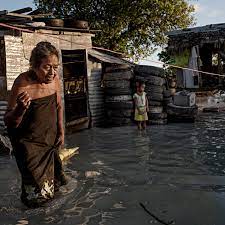Small island nations on the climate crisis frontlines have been overlooked in overseas aid, according to a new index.
Urging a move away from the current benchmark of using gross domestic product (GDP) to measure aid allocation, researchers from the Commonwealth secretariat and the Foundation for Studies and Research on International Development (Ferdi), a French thinktank, have developed the universal vulnerability index (UVI) as an alternative. GDP, they claim, fails to reflect the realities nations face, particularly on climate.
The index highlights the plight of small-island developing states (Sids), frequently excluded from development finance on the basis of relatively high GDP, while being “often disproportionately affected by shocks, as we have seen in Covid”, according to Travis Mitchell, head of economic policy at the secretariat.
“We are making the point that small states are very vulnerable and need support,” he said.
The index weighs vulnerability against resilience, looking at a list of 138 developing countries. The least developed, primarily in Africa, were the most vulnerable, but were closely followed by Sids in the Caribbean and Pacific. The UVI measures economic, sociopolitical and environmental vulnerabilities, using widely available data.
Measuring vulnerabilities outside government control, 21 of 34 Sids assessed were found to have “high economic vulnerability and very high vulnerability to climate change”, the report said. Five out of the six most structurally vulnerable countries in the Commonwealth are all Sids: the Maldives, Kiribati, Tuvalu, the Bahamas and Jamaica.
“One of the most interesting results from the index is that it we have evidence to align to the fact that GDP is not a good reflector of vulnerability,” said Mitchell. “High middle-income countries actually show a higher vulnerability than lower middle-income countries, according to the index.”
The Commonwealth secretary general, Patricia Scotland, said: “In an age of big data, complex analysis and artificial intelligence we cannot rely on decades-old systems and 18th-century concepts to guide us but must fundamentally overhaul the way we think about development finance.
“We need to move beyond the thin analysis that GDP and per capita income provide us in determining of the type of support vulnerable countries should receive, towards a more realistic, nuanced and comprehensive understanding of what drives vulnerability and resilience.”
Lady Scotland said the damage caused by Tropical Storm Erika in 2015 and Hurricane Maria in 2017 on Dominica showed why GDP did not reflect a country’s vulnerability. Ranked a middle-income country, Dominica “would not automatically have access to the sort of overseas development aid that it needed”, she said.
Scotland described the island states as canaries in a coalmine. “When the canaries don’t come back, you know the danger level is really high,” she said. “What we’ve seen is the small states, and the least developed countries, are those canaries, and they’re dying.”
Jitoko Tikolevu, Fiji’s high commissioner in the UK, said income-based measures rarely reflected reality. “The gross national income of Sids is inflated by exogenous sources of income, such as tourism and remittances, which have all been wiped out by the Covid-19 pandemic,” he said.
SOURCE: THE GUARDIAN/PACNEWS













